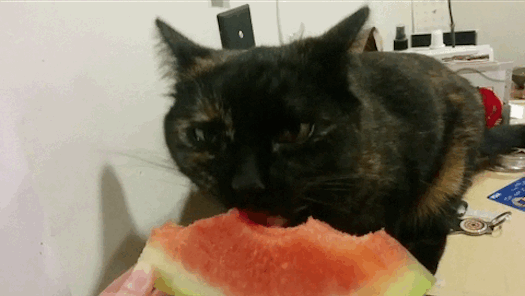Some Deeper Thoughts About GIFs
Insights from a man who has curated several museum exhibits of animated GIFs


Figgy Likes Watermelon
Ever thought of animated GIFs as slang? Or as message-board replacements for gestures in in-person conversations? I’ve never thought so deeply about GIFs, either. These cool insights come from a recent interview Museum of the Moving Image curator Jason Eppink gave to the U.S. Library of Congress’ “The Signal” blog.
Earlier this year, Eppink put together an exhibit of reaction GIFs, based on feedback he got after posting on Reddit, “I want to engage Reddit to collectively curate and define a ‘canon’ of reaction GIFs.” Homer Simpson disappearing into the bushes : the Internet :: Shakespeare : English literature.
You should visit The Signal for the full interview, but here were some of my favorite quotes from Eppink, who has curated a few exhibits with GIFs.
On why GIFs are made and shared without attribution to their original makers, and why everyone is okay with that:
We have a bias towards authorship when it comes to images because we’re transitioning from a world where image production was materially expensive. We expect the image to have an author because of the fundamental relationship of authorship to the economics of producing cultural artifacts. But today images are as cheap and prolific as the air that we utter our words with.
On GIFs and copyright law:
I suspect we’ll see case law made in the next five years affirming that animated GIFs are fair use.
On the idea that GIFs are Real Art now that they’ve appeared in a museum:
Artists have been working with GIFs practically since the format’s inception, and that’s a significant and often overlooked story.
Sadly, “The Reaction GIF: Moving Image as Gesture” exhibit is now over, but the canon lives on on Eppink’s website.